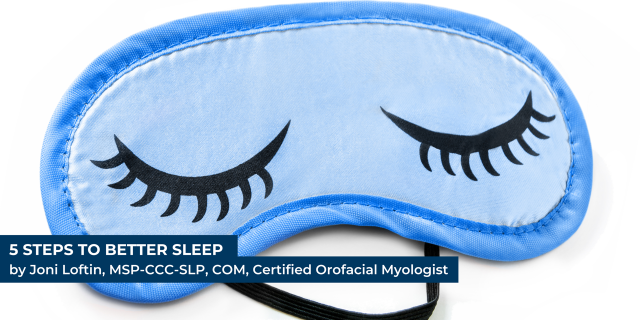
FACT: orofacial myofunctional therapy has been shown to improve daytime sleepiness, decrease snoring, and reduce AHIs (episodes of stopping or troubled breathing in sleep) by 62% in children and 50% in adults (Sleep journal published online May 1, 2015).
Myofunctional therapy has been recommended to play a primary role in the plan of care for individuals with sleep disorders. Studies have shown this therapy to play a vital supporting role with other medical-dental sleep treatments in obtaining the best outcome possible for improving sleep. These therapies focus on improving the airway. Good sleep hygiene practice is also essential to getting good sleep while working on improving or having already established a better airway. Don’t skimp on supporting your body and brain in getting the deep sleep they need nightly! There are good and bad habits that can make or break getting the zzzz’s you need to stay healthy. Here are just 4 examples:
- Avoid blue light, bright light, LED lights in the later afternoon and evening, since the spectrum of these lights tells your body it is morning or middle of the day, which confuses your brain about when it is supposed to wind down for sleep; instead, wear blue light blocking glasses to work on your computer or phone or to watch TV, starting early evening (or, better yet, avoid computer, phone, and TV screens within 2-3 hours of going to bed); avoid going places on school/work nights that have bright lights (e.g. grocery shopping), or wear blue light glasses in those environments, since you can get a pair with clear lenses.
- Use your bedroom only for romance and sleeping. Read somewhere else. Watch TV somewhere else…this trains your brain to associate your bedroom/bed with sleep (also, keep your bedroom cool – 65-68 degrees – since your body falls asleep when your core temperature cools)
- Avoid drinking alcohol or eating 2-3 hours prior to your bedtime, so that your body can focus on sleep and not digestion when you get into bed.
- Sometime before going to bed, write down or just take time to think about (identify) any worries or anxieties on your mind, then decide on the next step you will take to address them (e.g. I am going to call her in the morning; I will respond to his email in this way; I will suggest that we…). That way, if you wake up thinking about 1 or more of these, you can tell your brain, “I already have a plan for the next step and don’t need to worry about this right now. I can worry if the next step doesn’t resolve it. We can go back to sleep”. You might be surprised how often your brain will listen to you.
- Meanwhile…if you are awake for several minutes or longer in the middle of the night and #4 above is not working….try to keep your eyes open. If you have your eyes closed, but are “awake”, your body may be comfortable just resting versus sleeping. Challenge yourself to keep your eyes open and you may end up falling asleep while focusing on that.
Improving sleep is a journey. Take it one day and one sleep hygiene habit at a time!
Joni Loftin, MSP-CCC-SLP, COM, Certified Orofacial Myologist